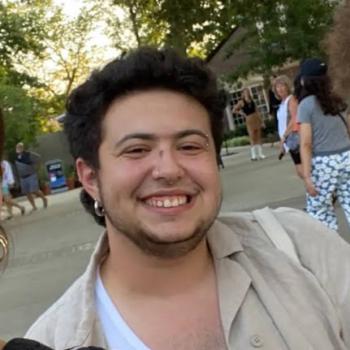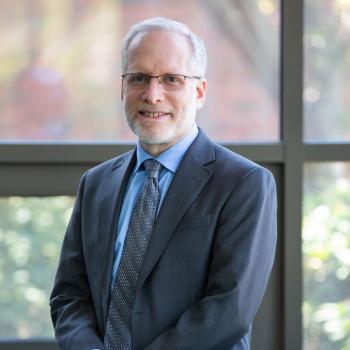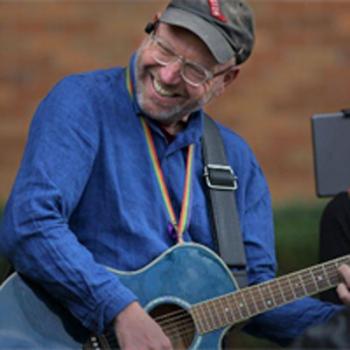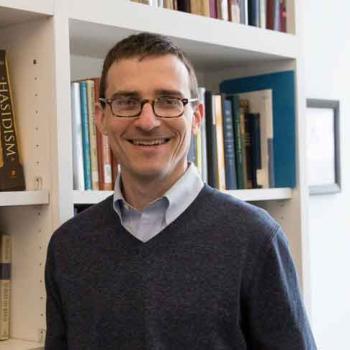By Rav-Hazzan Ken Richmond
Parashat Lech Lecha (Genesis 12:1-17:27)
Last week, while talking about the news in Israel, my ten-year-old asked me, “Why don’t some people like other people?” I told him about people hating other people because they are different, because they are jealous or scared of them. I talked about competing claims for land or resources. I spoke about the long tradition of scapegoats, of people in power oppressing a populace but channeling their resentment towards Jews or other vulnerable groups. By that point my ten-year-old was wandering around the room. I asked if he wanted to talk about it more, and he said, “I thought you were going to give a short answer.” We searched for a short answer to his question, but the best we could come up with was, “I don’t know.”
In normal times, I would see in our Torah portion, Lech Lecha, new possibilities, the beginning of the Jewish people, the Divine charge to set off on a journey and to be a blessing to those around us. These difficult times since Hamas’s Simchat Torah massacre of October 7 call my attention to darker parts of the portion that might address my son’s question about people not liking each other, or not liking Jews in particular.
God’s opening words to Abram (who becomes Abraham by the end of the parashah) include, sandwiched between the many words of blessing, God’s promise to curse those who curse him. The phrase may be hypothetical, but from the first moments of the Jewish people coming into existence, God is acknowledging the dangers of those who will hate and oppose us.
Our portion goes on, in chapter 14, to detail the first war in the Torah, with four kings successfully attacking five kings. While plundering, they capture Abraham’s nephew Lot and his possessions, taking him hostage. According to the Italian commentator Seforno, the kings were aware of Abraham’s wealth and kidnapped Lot with a large ransom in mind. Abraham foils their plans by swiftly gathering a group of three hundred and eighteen soldiers, pursuing the four kings, and mounting a surprise attack by night, in which he rescues his nephew, along with many other captives.
As of this writing, Hamas still holds about two hundred Israelis hostage in Gaza. The captives range in age from small children to the elderly and include some with serious medical conditions. We can pray for a rescue like that carried out by Abraham, or by Yoni Netanyahu and his unit at Entebbe. But the number of the hostages and the cruelty of their captors make prospects difficult. The Israeli military is left with horrible choices, as it strives to eliminate Hamas, minimize civilian casualties, and rescue hostages without harming them. The Israeli government will have to weigh the competing demands of the treasured mitzvah, all too common in Jewish history, of ransoming captives, with the existential need to prevent Hamas from ever being able to commit such atrocities again. And it will need to do so while upholding the ethics of war against an enemy that has no such compunctions.
Later in the portion, we read a strange passage that is quoted in the Passover Seder. After Abraham follows God’s instructions to make an unusual offering with animals divided in half, a deep sleep falls upon him, and a dread, a great darkness. God says: “Know well that your offspring shall be strangers in a land not theirs, and they shall be enslaved and oppressed for four hundred years; but I will execute judgment on the nation they shall serve, and in the end they shall go free with great wealth. As for you, you shall go to your fathers in peace; you shall be buried at a ripe old age.” (Genesis 15:13-15)
Pastorally speaking, I’m not sure how reassuring this message might have been to Abraham, but I suppose the message is really intended for us—Jews throughout the generations who have experienced anti-Semitism and oppression, directly or indirectly, in various ways. God’s message of reassurance to Abraham is rephrased in the verses of the Haggadah that follow this quote, the words of Vehi She’amdah: “This is the promise that has sustained our ancestors and us. For not one enemy alone has risen up to destroy us; rather, in every generation, enemies rise up to destroy us, and the Holy Blessed One rescues us from their hands.”
Our Torah portion acknowledges from the first moments of Jewish peoplehood that there are some people who won’t like us, some people who choose to do more harm than good in the world. But God’s promise to Abraham, along with the words of “Vehi She’amdah,” remind us of the great resilience of the Jewish people, how we have miraculously survived throughout our long and often difficult history. Part of our secret goes back to God’s initial charge to Abraham, in which blessings outweigh curses, the implication being that most people in the world lean on the side of blessing and that we can do our part to tip the scales in that direction. In these difficult times, may we tap into generations of Jewish and human resilience, while doing our best to follow Abraham and Sarah’s example of blazing new paths and spreading blessing in an imperfect world.
Please send feedback to the author here.
Rav Hazzan Ken Richmond is the co-senior Rabbi of Temple Israel of Natick and has served as Cantor there since 2006. He received s’micha (rabbinic ordination) from Hebrew College’s Rabbinical School in 2021.
Learn more about Hebrew College’s rabbinical program at Ta Sh’ma (Come & Hear), our November Open Houses (in-person & virtual options).

















